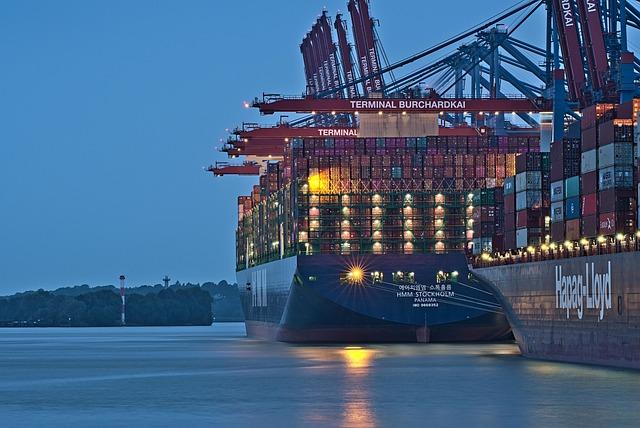Trade between Ireland and France has surged by 30% since the UK’s departure from the European Union, according to recent data reported by The Irish Times. Despite initial concerns over potential disruptions caused by Brexit, economic ties between the two nations have strengthened significantly, highlighting a shift in Ireland‚Äôs trading landscape. This increase underscores the evolving dynamics of post-Brexit commerce and points to new opportunities for bilateral cooperation within the EU framework.
Ireland France Trade Growth Signals Strength in Post Brexit Relations
The recent surge in trade volumes between Ireland and France represents a noteworthy milestone in reinforcing economic ties following the United Kingdom’s departure from the European Union. Export and import figures have demonstrated a dynamic 30% increase, underscoring how both nations have actively pivoted towards enhancing bilateral commerce. Key sectors driving this growth include technology, agriculture, and pharmaceuticals, with Irish tech firms expanding their footprint in French markets and French agricultural exports filling growing demands in Ireland.
Industry experts highlight several factors contributing to this upward trajectory:
- Streamlined customs procedures: New bilateral agreements have minimized delays at borders, allowing smoother logistics.
- Investment in infrastructure: Improved transport links such as ferry services and air freight routes bolster supply chain efficiency.
- Shared regulatory frameworks: Harmonization of standards supports quicker product approvals and market access.
| Sector | Trade Growth (%) | Key Highlights |
|---|---|---|
| Technology | 35 | Increased software exports |
| Agriculture | 28 | Boost in organic produce trade |
| Pharmaceuticals | 32 | Expanded collaboration on R&D |
Key Sectors Driving the Surge in Bilateral Commerce
Since Brexit, several sectors have emerged as the primary engines behind the impressive 30% growth in trade between Ireland and France. The agriculture and food industry has been a standout performer, with exports of premium Irish dairy products and artisanal cheeses seeing a significant uptick in demand across French markets. Equally, the pharmaceutical and healthcare sectors have strengthened their cross-border ties, driven by collaborative research initiatives and increased export of medicinal products.
Meanwhile, the technology and telecommunications industries continue to expand their footprint, supported by growing investments and business partnerships in both countries. The creative industries, including film and design, have also contributed to the surge by capitalizing on co-production agreements and cultural exchanges. Below is a quick summary of the key sectors and their trade contribution since Brexit:
| Sector | Trade Growth (%) | Key Products/Services |
|---|---|---|
| Agriculture & Food | 35% | Dairy, Cheese, Organic Produce |
| Pharmaceuticals & Healthcare | 28% | Medicines, Research Collaborations |
| Technology & Telecoms | 32% | Software, Networking Solutions |
| Creative Industries | 20% | Film, Design, Media Exchange |
Challenges and Opportunities for Irish and French Businesses
The surge in trade between Ireland and France, rising by 30% since Brexit, has unveiled a complex landscape filled with both significant hurdles and promising avenues for growth. Irish companies are grappling with new regulatory frameworks and customs checks, which have led to increased operational costs and delivery delays. Meanwhile, French firms face challenges linked to currency volatility and adapting to evolving trade policies within the European Union. Despite these obstacles, both markets have showcased remarkable resilience by forging stronger logistic networks and investing in digital transformation to streamline cross-border transactions.
Opportunities emerging from this trade evolution include:
- Expanding sectors such as green energy, technology, and agribusiness benefiting from cooperative R&D efforts.
- Enhanced bilateral partnerships supported by government incentives and trade facilitation agreements.
- Growing demand for sustainable products driving innovation across both markets.
| Sector | Irish Export Growth | French Import Growth |
|---|---|---|
| Technology | +35% | +30% |
| Agriculture | +25% | +28% |
| Green Energy | +40% | +35% |
Strategic Recommendations to Sustain and Enhance Trade Expansion
Enhancing bilateral trade relations between Ireland and France requires deliberate policy frameworks that promote seamless cross-border commerce. Investing in advanced logistics infrastructure and digitized customs procedures can dramatically reduce transaction times, making trade more efficient. Encouraging collaborative ventures between Irish and French SMEs will foster innovation and diversify export portfolios, thereby securing market resilience. Additionally, harmonizing regulatory standards in sectors such as agri-foods and technology will mitigate trade barriers and build mutual trust.
Government-led initiatives should prioritize targeted trade missions and knowledge exchanges to stimulate deeper sectoral integration. Establishing a bilateral trade council will facilitate ongoing dialogue and rapidly address emerging challenges. Below is a strategic roadmap illustrating key focus areas for sustained growth:
| Focus Area | Recommended Action | Expected Outcome |
|---|---|---|
| Customs Efficiency | Implement AI-driven border control | Faster clearance & reduced costs |
| SME Collaboration | Joint innovation grants | Expanded product offerings |
| Regulatory Alignment | Streamline certification processes | Lower trade barriers |
| Trade Promotion | Annual Ireland-France trade summit | Improved stakeholder engagement |
Insights and Conclusions
As Ireland and France continue to deepen their economic ties, the 30% surge in trade since Brexit underscores a significant realignment in European commerce. This upturn not only highlights the resilience and adaptability of Irish exporters but also signals the growing importance of Franco-Irish partnerships in a shifting geopolitical landscape. Moving forward, both nations appear well-positioned to capitalize on these strengthened relations, fostering sustained growth amid ongoing post-Brexit challenges.




